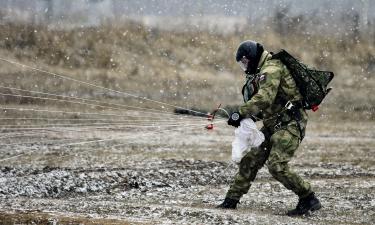Poland and Bulgaria show their vassal bravado and refuse to purchase gas from Russia
Now is the time to see how the Europeans can cope with the challenges of the proxy war with Russia. For the time being, they are confident that the cunning plan will work.
Bulgaria and Poland no longer receive Russian gas
On Wednesday, April 27, Gazprom stopped gas supplies to Bulgaria and Poland, after Bulgargaz (Bulgaria) and PGNiG (Poland) did not wire their payments to the Russian company for April supplies.
In accordance with the decree signed by the President of the Russian Federation, payments for gas supplied from April 1 must be made through open ruble accounts. Counterparties were informed about the change in a timely manner.
Gazprom Export notified Bulgargaz and PGNiG of the suspension of gas supplies, but they can be resumed if the countries accept the new Russian requirements.
In the event of unauthorized withdrawal of Russian gas to third countries (via Yamal and Turkish Stream pipelines), transit supplies will be reduced accordingly, Gazprom noted.
Bulgaria lost its sovereignty a long time ago
Bulgarian experts believe that the situation is much more complicated for Bulgaria than it is for Poland, since Bulgaria's dependence on Russian natural gas reaches 90 percent (40 percent — for Poland).
"We are not ready for this step," Plamen Pavlov, Chairman of the Bulgarian Gas Association, said, Money reports.
Industrial enterprises will be affected most:
- glass factories,
- fertilizer plants
- Neftokhim oil refinery.
- According to Pavlov, the above-mentioned enterprises will cease to be competitive.
Energy expert Ivan Khinovskiy pointed out that hospitals and other social infrastructure will experience problems in the first place as the heating season is over.
Another expert, Elenĸo Bozhĸov, believes that Bulgaria should switch to an alternative type of fuel, such as fuel oil. He suggested, though, that some European companies would be willing to pay in Russian rubles and they will thus be able to supply gas to Bulgaria.
Bulgarian experts say that Bulgaria may switch to LNG through a terminal in Greece. The terminal will be ready in June, but LNG will be 20-30 percent more expensive than pipeline gas, which will cause the inflation rate to grow.
Plamen Pavlov believes that it is the government of Bulgaria that carries responsibility for the situation the country has found itself in.
Igor Yushkov, an expert at the Financial University at the Russian government, told Pravda.Ru that Russia sees Bulgaria as a country with limited sovereignty. First, the Bulgarians pulled out from the South Stream project under pressure from the United States. Today, they do not want to amended contracts with Russia for the same reason.
"They put pressure on Bulgaria, whereas the Bulgarians try to make everything look like as if they decide everything for themsevles,” said Igor Yushkov.
Poland and Bulgaria want to buy Russian gas through intermediaries
Poland is less hectic about the current development as the country was preparing to cut Russian gas off. Poland's PGNiG considers Gazprom's decision to be a breach of contract and intends to file arbitration claims.
As Igor Yushkov explained, "no one will comply with the decision of the arbitration, because it is clear that it will be politicized."
"No arbitration can solve anything now. Everything has become quite simple. You pay money to get gas. If you don't pay money, you don't get gas," the expert said.
Polish gas storage facilities are currently 75 percent full. These reserves will be enough until autumn. Afterwards, the Poles will hope for the Baltic Gas Pipeline that will ensure the supplies of Norwegian gas. Poland also hopes that gas supplies along the pipeline connecting Poland and Lithuania will begin in May (the pipeline receives gas from a floating LNG terminal).
In addition, Poland already buys natural gas from Germany in reverse through the Yamal gas pipeline — this is Russian gas that goes through Nord Stream 1 that works at 100-percent capacity.
We would like to note here that if German buyers do not open ruble accounts, Poland's cunning plan will fall apart.
Polish experts also expect gas prices and inflation to rise. Gas prices for entrepreneurs in Poland already increased in autumn and winter – in some cases by several hundred percent (the government regulates population tariffs).
Igor Yushkov pointed out that Poland would have enough gas for the summer period. However, there is a problem with the Baltic gas pipeline. The system is designed for 10 billion cubic meters per year, but it can now transport only 3 billion cubic meters as there is no more fuel coming from anyone.
"They will have questions as winter approaches. They will need to decide what they have for the next heating season," the expert noted.
Meanwhile, ten European buyers have already opened special accounts with Gazprombank.
Igor Yushkov believes that the new mechanism is absolutely comfortable for commercial companies. Commercial companies do not have to look for Russian rubles anywhere. They will be wiring euros and dollars to Russia as before. The only difference is in the bank details: now they will have to make payments to the accounts of Gazprombank, rather than to Gazprom.
In the past, the expert believes, one could make payments, inter alia, to Gazprom's European subsidiaries. In a nutshell, there were accounts in European banks, but it is only Russia that can get all the payments for Russian natural gas. This mechanism is much safer to Russia.
EU lacks unified gas policy
"The announcement by Gazprom that it is unilaterally stopping delivery of gas to customers in Europe is yet another attempt by Russia to use gas as an instrument of blackmail," European Commission President Ursula von der Leyen said. "This is unjustified and unacceptable. And it shows once again the unreliability of Russia as a gas supplier," she said in a statement.
According to Igor Yushkov, the EU does not have a unified gas policy. The European Union is more than happy to blackmail Russia at all times. The EU is constantly changing contractual terms without Gazprom's approval. They did not allow the re-export of gas, but the they lifted the ban. To crown it all, EU officials never stop talking about their intention to scale down gas purchases.
Subscribe to Pravda.Ru Telegram channel, Facebook, RSS!





